#cosmic drama
Explore tagged Tumblr posts
Photo

3:25 PM EDT September 9, 2024:
Voivod - "Cosmic Drama" From the album Dimension Hatröss (June 29, 1988)
Last song scrobbled from iTunes at Last.fm
'Inside a giant particle accelerator , a beam of protons, traveling at near the speed of light meets a beam of antiprotons moving equally as fast in the opposite direction. The protons and mirror-image antiprotons annihilate each other, creating the fiery chaos of a parallel micro-galaxy. Experiment One complete, the Voïvod goes into that new dimension, meeting different civilizations and psychic entities, extracting knowledge and energy in the eight programs of this project called: Dimension Hatröss'
Epilog.
File under: Cybermetal
3 notes
·
View notes
Text

Mike Luckovich
* * * *
Looking at the state of the world on the level of 'fact' and 'logic' I can find little ground for hope that our species can turn things around but, nowadays, I sense more of our interconnectedness at deeper levels than I used to. Every act issuing from a little more presence and conscience than is habitual may contribute more than the numerical sum of its outer results. I somehow-or-other see/feel/know this to be true - and grounds for a certain kind of hope.
On which note, I just tripped over this Bennett quote:
“We are faced with the need to make real present sacrifices in order to serve a future in which we may not even be alive. Not one man in ten thousand is capable of such self-denial. Gurdjieff’s message bridges the gap: our own immediate welfare is bound up with the entire life of the Earth and its future. We cannot fulfil ourselves even to the extent of achieving happiness or security, unless we play our part in the Cosmic Drama. In all appeals to the conscience of mankind to combat pollution, the squandering of resources and the destruction of our plant and animal genera, there is a missing link. They do not answer the question: “But what does all that mean to me personally, more than my own welfare and that of my family?”. Gurdjieff shows us how and why our personal well-being no less than our prospect of achieving ‘real being’ depends on the way we serve all life on the Earth.”
~ JG Bennett
[Thanks to Ian Sanders]
#Mike Luckovich#Smokey Bear#climate change#Ian Sanders#Earth#JG Bennett#quotes#Climate emergency#Gurdjieff#cosmic drama
19 notes
·
View notes
Text
"Epic Majesty: John Milton's 'Paradise Lost' and the Theological Tapestry of the Human Condition"

John Milton's "Paradise Lost" stands as an unparalleled epic that delves into the cosmic realms of theology, morality, and the human experience. Published in 1667, this monumental work continues to resonate across centuries, offering readers an expansive canvas upon which the grand tapestry of creation, rebellion, and redemption unfolds. The title itself evokes the poignant irony of a paradise lost and the intricate theological explorations that define Milton's magnum opus.
The narrative centers on the biblical tale of the Fall of Man, tracing the events from Satan's rebellion in Heaven to Adam and Eve's expulsion from the Garden of Eden. Milton's blank verse is a majestic river of language, a flowing current that navigates through the celestial and terrestrial landscapes with a divine eloquence. The poetic richness and rhythmic cadence of Milton's verses contribute to the epic grandeur of the work, elevating it to the status of one of the greatest literary achievements in the English language.
At the heart of "Paradise Lost" lies the enigmatic figure of Satan, a rebellious angel whose defiance of God sets in motion the cosmic drama. Milton's portrayal of Satan is complex and multifaceted, challenging readers to grapple with questions of free will, pride, and the nature of evil. The character of Satan becomes a tragic figure, a charismatic and flawed entity whose rebellion is fueled by a misguided sense of autonomy.
Milton's exploration of Adam and Eve, the first human couple, adds another layer to the theological discourse. Their innocence, fallibility, and subsequent expulsion from Eden become symbolic of the broader human experience—caught between the desire for knowledge and the consequences of disobedience. The interplay between free will, temptation, and the inevitability of divine judgment forms the thematic backbone of the narrative.
"Paradise Lost" also engages with profound theological questions, reflecting Milton's own Puritan convictions and his dissent against the hierarchical structure of the Church of England. The work contemplates the nature of God, the problem of evil, and the redemptive power of divine grace. Milton's theological stance, however, remains dynamic, allowing for diverse interpretations and sparking scholarly debates on the nuances of his religious beliefs.
The epic's enduring appeal lies not only in its theological depth but also in its universal themes that transcend religious boundaries. Milton's exploration of the human condition—its aspirations, flaws, and the perennial struggle between good and evil—resonates with readers across cultures and time periods. "Paradise Lost" serves as a testament to the enduring power of literature to grapple with fundamental questions of existence.
In conclusion, John Milton's "Paradise Lost" is a literary colossus that stands at the intersection of theology, philosophy, and literature. The title encapsulates the essence of the narrative—an epic portrayal of the cosmic struggle between divine order and human agency. Milton's poetic brilliance and profound exploration of theological themes ensure that "Paradise Lost" remains an ever-relevant masterpiece that invites readers to ponder the complexities of the human condition and the timeless quest for meaning in a world marked by both paradise and loss.
John Milton's "Paradise Lost" is available in Amazon in paperback 16.99$ and hardcover 24.99$ editions.
Number of pages: 469
Language: English
Rating: 9/10
Link of the book!
Review By: King's Cat
#John Milton#Paradise Lost#The Fall of Man#Theological epic#Biblical narrative#Cosmic drama#Blank verse#Grand tapestry#Creation#Rebellion#Redemption#Biblical tale#Satan#Divine eloquence#Epic grandeur#Literary achievement#English language#Free will#Pride#Nature of evil#Tragic figure#Charismatic#Flawed#Autonomy#Adam and Eve#Garden of Eden#First human couple#Human experience#Desire for knowledge#Consequences of disobedience
6 notes
·
View notes
Text
Ramayana No. 4: The Human Role in the Cosmic Drama—Reflections on Universal Responsibility
Previous Post in this Series: Title: 3: The Battle Within—Reflections on Dharma, Maya, and the Path to Enlightenment Next Post in this Series: Title: 5: A Choice of Paths—Righteous vs. Unrighteous Motivation As I reflect on the early chapters of the Ramayana, one theme stands out to me: the unique and pivotal role that human beings play in the battle between good and evil. In this epic, we see…
#Buddhist Philosophy#Compassion#Cosmic Drama#Dalai Lama#Dharma#ethical living#Good vs Evil#Hindu Philosophy#human potential#Inner Conflict#interconnectedness#meditation#Overcoming Evil#Pratyayas#pristine mind#Ramayana#Self-Realization#spiritual journey#universal responsibility#Vrittis
0 notes
Text
youtube
Voivod - Cosmic Drama
0 notes
Text
"Epic Majesty: John Milton's 'Paradise Lost' and the Theological Tapestry of the Human Condition"
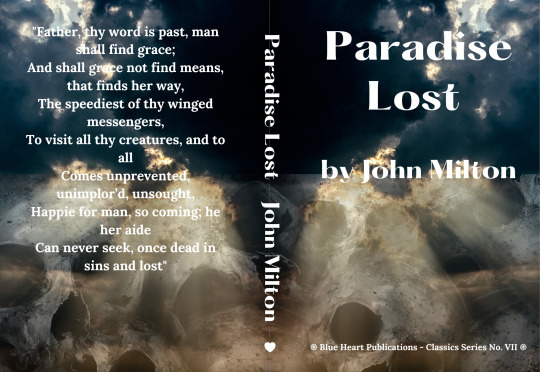
John Milton's "Paradise Lost" stands as an unparalleled epic that delves into the cosmic realms of theology, morality, and the human experience. Published in 1667, this monumental work continues to resonate across centuries, offering readers an expansive canvas upon which the grand tapestry of creation, rebellion, and redemption unfolds. The title itself evokes the poignant irony of a paradise lost and the intricate theological explorations that define Milton's magnum opus.
The narrative centers on the biblical tale of the Fall of Man, tracing the events from Satan's rebellion in Heaven to Adam and Eve's expulsion from the Garden of Eden. Milton's blank verse is a majestic river of language, a flowing current that navigates through the celestial and terrestrial landscapes with a divine eloquence. The poetic richness and rhythmic cadence of Milton's verses contribute to the epic grandeur of the work, elevating it to the status of one of the greatest literary achievements in the English language.
At the heart of "Paradise Lost" lies the enigmatic figure of Satan, a rebellious angel whose defiance of God sets in motion the cosmic drama. Milton's portrayal of Satan is complex and multifaceted, challenging readers to grapple with questions of free will, pride, and the nature of evil. The character of Satan becomes a tragic figure, a charismatic and flawed entity whose rebellion is fueled by a misguided sense of autonomy.
Milton's exploration of Adam and Eve, the first human couple, adds another layer to the theological discourse. Their innocence, fallibility, and subsequent expulsion from Eden become symbolic of the broader human experience—caught between the desire for knowledge and the consequences of disobedience. The interplay between free will, temptation, and the inevitability of divine judgment forms the thematic backbone of the narrative.
"Paradise Lost" also engages with profound theological questions, reflecting Milton's own Puritan convictions and his dissent against the hierarchical structure of the Church of England. The work contemplates the nature of God, the problem of evil, and the redemptive power of divine grace. Milton's theological stance, however, remains dynamic, allowing for diverse interpretations and sparking scholarly debates on the nuances of his religious beliefs.
The epic's enduring appeal lies not only in its theological depth but also in its universal themes that transcend religious boundaries. Milton's exploration of the human condition—its aspirations, flaws, and the perennial struggle between good and evil—resonates with readers across cultures and time periods. "Paradise Lost" serves as a testament to the enduring power of literature to grapple with fundamental questions of existence.
In conclusion, John Milton's "Paradise Lost" is a literary colossus that stands at the intersection of theology, philosophy, and literature. The title encapsulates the essence of the narrative—an epic portrayal of the cosmic struggle between divine order and human agency. Milton's poetic brilliance and profound exploration of theological themes ensure that "Paradise Lost" remains an ever-relevant masterpiece that invites readers to ponder the complexities of the human condition and the timeless quest for meaning in a world marked by both paradise and loss.
John Milton's "Paradise Lost" is available in Amazon in paperback 16.99$ and hardcover 24.99$ editions.
Number of pages: 469
Language: English
Rating: 9/10
Link of the book!
Review By: King's Cat
#John Milton#Paradise Lost#The Fall of Man#Theological epic#Biblical narrative#Cosmic drama#Blank verse#Grand tapestry#Creation#Rebellion#Redemption#Biblical tale#Satan#Divine eloquence#Epic grandeur#Literary achievement#English language#Free will#Pride#Nature of evil#Tragic figure#Charismatic#Flawed#Autonomy#Adam and Eve#Garden of Eden#First human couple#Human experience#Desire for knowledge#Consequences of disobedience
0 notes
Text
tolkien is full of three dimensional villains who understand the mistakes that they've made and regret them, or who have very understandable motivations that we literally watch spiral downward. melkor, meanwhile, came into existence as the strongest prettiest best cosmic entity, immediately started trying to fight god for the aux cord, and made it everyone else's problem for the next All Of Existence
#the silmarillion#he gives heather from total drama with the addition of cosmic might#hit the ground HATING#gets consequences learns Nothing#melkor#he started playing in the void puddle got told no and took that personally.
2K notes
·
View notes
Text
I read Fat Face by Michael Shea last month and it was. Fine? It was a Cthulhu Mythos story written in the 80s, it was very edgy and it had a lot of tropes I’m not a fan of, I don’t really recommend it, but I have to talk about one detail I have not stopped thinking about since I read it.
So. I knew Fat Face through reputation because it was the story that inspired Shoggoth Lords from the Call of Cthulhu TTRPG, shoggoths that can control their cellular makeup to look like humans. And the twist in Fat Face is that shoggoths have been hiding amongst humans in Los Angeles, and at the end of the story one of them eats the protagonist.
The tone of the story is grit. It’s grime. It’s sleaze and sexual violence and drug abuse on top of cosmic horror. It wants to be taken seriously so bad.
But here’s the thing about the shoggoths: they have a business.
They have two businesses they run out of an office building in downtown Los Angeles. A shoggoth is a primordial blob of eyes and mouths and flesh and hunger, and the idea of one of them at the LA Office of Finance registering an LLC is already. Great. Perfect. No notes.
The business is a front — and again, that’s great, a shoggoth went, “I want to do some nefarious deeds and not get caught by humans; I know, I’ll register a fake business that’ll be a front, and no human will ever suspect” — because the actual interior of this office is a room of pools of water made from black and ancient Antarctic rocks so that shoggoths can relax in their original blobby forms and eat stray animals that they’ve caught.
So it’s basically just. A place for shoggoths to unwind after a long day of pretending to be human. It’s portrayed as cosmic horror, but it’s shoggoth Cheers. Sometimes you wanna go where nobody knows your shape.
Here’s the kicker. The front of the business is a hydrotherapy clinic and stray pet rescue.
When they decided to make a front for their secret lair in an LA office building where they hang out in pools of water and eat stray animals — the front they prominently display and advertise — they decided to go with a hydrotherapy clinic and stray pet rescue.
That is Goosebumps shit. The rest of the story reads like a tone poem about the sleaze and violence of Los Angeles, and the main twist of the story reads like R.L. Stine.
But that’s not even the detail I can’t stop thinking about. Because the story reveals that this business — which again, is a front made by alien blobs to eat stray animals like an ALF-themed buffet and hang out in jacuzzi tubs of Antarctic rocks in an LA office — has a flyer.
Which means there’s a shoggoth with a passion for graphic design
#lovecraft#shoggoth#horror#and this isn’t me demanding realism in my cthulhu mythos#but i think it proves that at a certain point grim and gritty storytelling becomes absurdist comedy#the rest of the story is a gritty crime drama about being a sex worker who breasts boobily under the pitiless california sun#and the twist which is supposed to be cosmic horror elevates it into zany cartoonishness
4K notes
·
View notes
Text
okay so since the OVA has revealed that post-s1, tadashi and ainosuke are actually getting along remarkably well (by THEIR standards lol), i hope that in s2 the arranged heterosexual political marriage plotline comes back as an instigator of drama 😈
#sk8#sk8 the infinity#tadaai#kikuchi tadashi#shindo ainosuke#make no mistake i want tadaai to be happy together in the end#but i want them to go through some external drama together now that their major interpersonal drama is on the mend 😈#cosmic original
95 notes
·
View notes
Text














August in the Water (1995)
Dir. Gakuryū Ishii
#august in the water#gakuryu ishii#sogo ishii#film#movie#drama#japan#japanese film#asian cinema#cinema#asian film#japanese#romance#surrealism#cosmic#90s#mythical#petroglyphs#supernova#izumi#mao#meteorite
106 notes
·
View notes
Text
Merry Christmas everyone!
I have some gifts .^.
I know I didn’t make many gifts but I did what I could with the time I had this year— It’s been a busy Christmas for my family lol— So I’m sorry to those I didn’t make a gift for, I still love you and I hope you still have a very Merry Christmas, and if you don’t celebrate Christmas, have a wonderful rest of your day!
🎁For @marshmallow-biscuit-blog / @time-can-fly I drew their design of Sonic and Amy’s fankid, Tidal🎄

🎁For @fizzypopsoda-comics I drew their sona with Scary Girl/Lauren from Total Drama Island🎄

🎁For @purplemang0z I drew their ocs Madeline and Aspen🎄

🎁For @the-cosmic-cowbo-y I drew their oc Cosmic Knightsstar🎄

🎁For @demonangelgirl134 I drew their oc Roxy Morningstar with the Devil from the Cuphead Show🎄

🎁For @cupcakeruth I drew their oc Sir Chandler🎄

#merry christmas#christmas gift#gifts#my art#not my ocs#not my characters#friends ocs#sonic oc#fankid#sonamy#sonamy fankid#not my sona#scary girl total drama#lauren td#total drama#madeline and aspen#cosmic knightsstar#roxy#roxy morningstar#the devil cuphead#the cuphead show#cuphead show#sir chandler#not mine#tw knives#tw knife
32 notes
·
View notes
Photo

8:00 PM EST December 19, 2023:
Voivod - "Cosmic Drama" From the album Dimension Hatröss (June 29, 1988)
Last song scrobbled from iTunes at Last.fm
'Inside a giant particle accelerator , a beam of protons, traveling at near the speed of light meets a beam of antiprotons moving equally as fast in the opposite direction. The protons and mirror-image antiprotons annihilate each other, creating the fiery chaos of a parallel micro-galaxy. Experiment One complete, the Voïvod goes into that new dimension, meeting different civilizations and psychic entities, extracting knowledge and energy in the eight programs of this project called: Dimension Hatröss'
Epilog.
File under: Progressive Metal
3 notes
·
View notes
Text
Ye chori @celesteablack badi drama queen hai
16 notes
·
View notes
Text
S2 CAST!
S2 will follow roughly the same format as S1 - narrated stories - but this time we’re more in media res, AND! our fabulous S1 ensemble are stepping up to become main characters. So here’s a reminder of who’s who, as well as an introduction to some new folks!
Starting with most beloved human person Cai, who I'm so thrilled will be able to show off even more of their skills in S2.

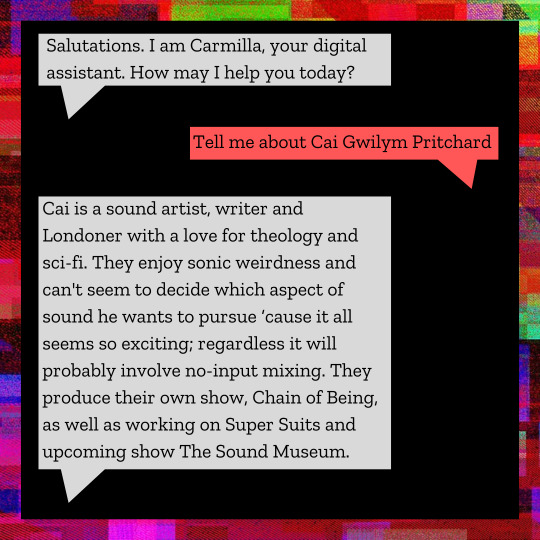
And now cast!


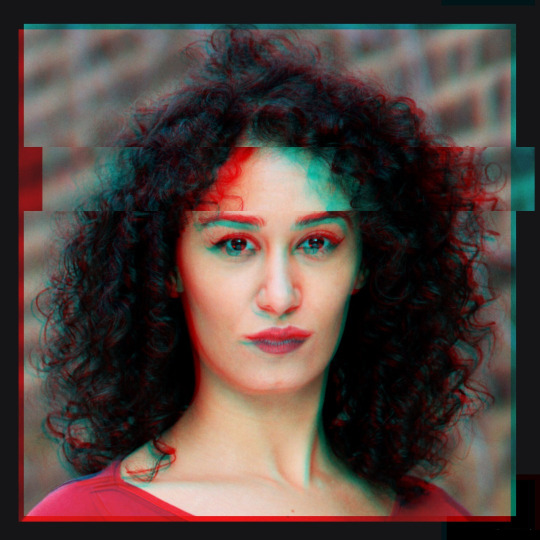




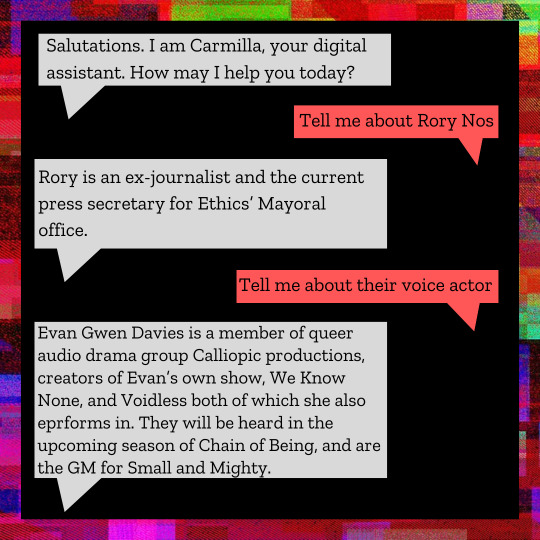
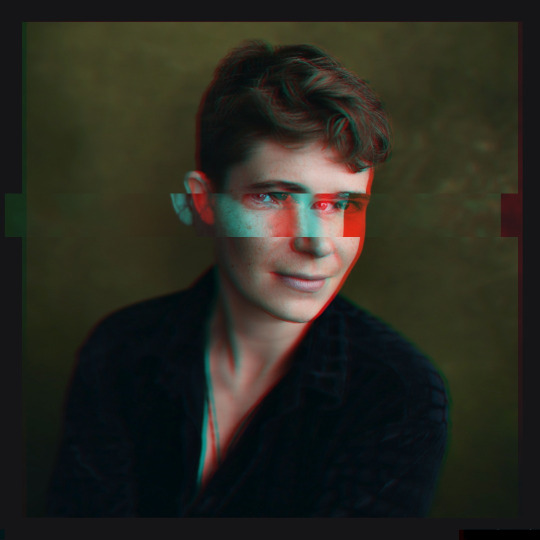








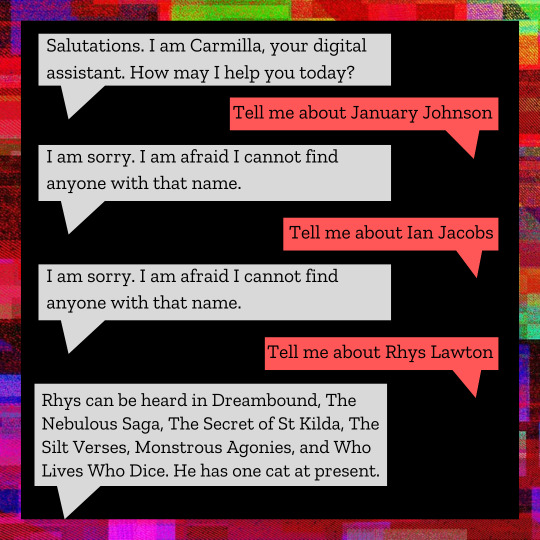
And now our amazing new folks!

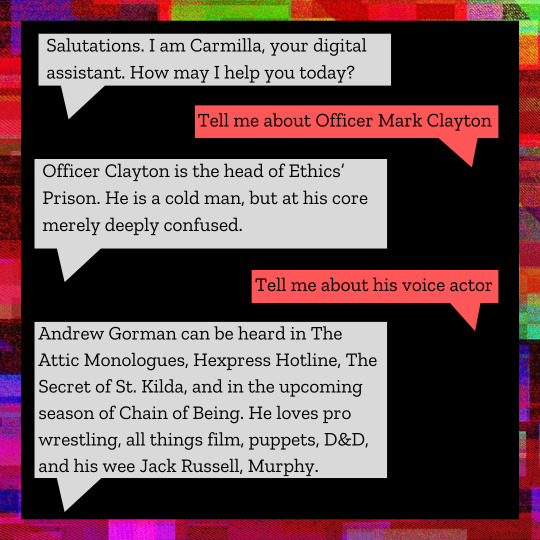



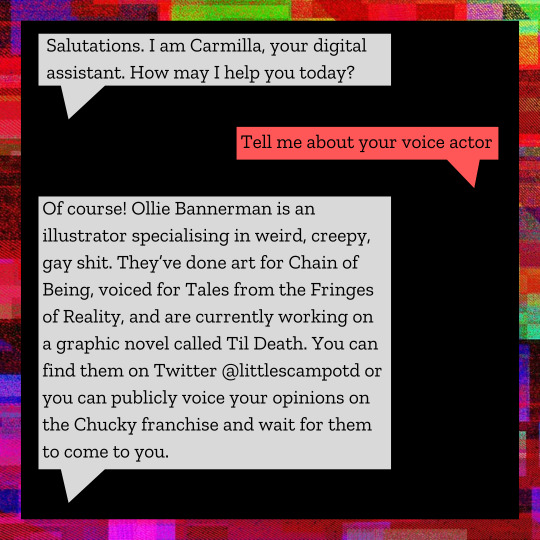
We have one final announcement to come, we're just missing a headshot, so keep an eye out!
Plus, episode 5 features guests from Chain of Being, The Wyrd Side, Super Suits and more, but those are secrets for future ;)
75 notes
·
View notes
Text
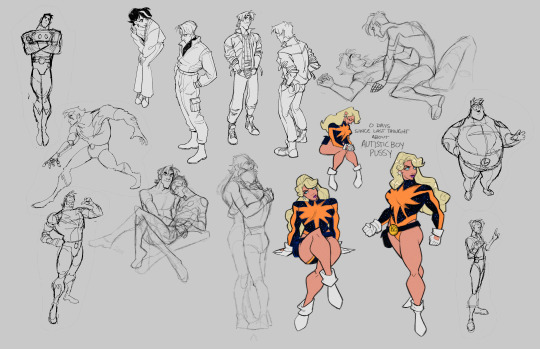
more legion posting
#my art#legion of superheroes#brainiac 5#invisible kid#shrinking violet#andromeda#lightning lad#cosmic boy#bouncing boy#lyle norg x querl dox#dc let me write legion i will write the funniest love triangle between lyle querl and laurel#i think its hilarious brainy's got andromeda fucking biting at the bars of her enclosure like girl you're so valid#i also think the garth/irma/rokk love triangle is great but we could go even harder#the ideal legion energy is where they have college dorm levels of drama
267 notes
·
View notes
Text
I’m so glad I started to listen to Star Trek audio dramas. The silver age comic levels of whimsy and shenanigans in them is incredible.
#there was a magic race from Atlantis trapped in time that were trapped by a cosmic baby that was looking for its mother (the sun)#and not only that the baby was stopped (it was made time stop and that’s VERY bad) by forcing the memories of that magic race’s culture#and also later the entirety of Vulcan culture (one of the oldest races ever and added billions of new minds into the spell)#which is WILD to think that the oldest race only adds billions of minds into the fray.#they learn at the end that the magic race was the Lost City of Atlantis and Spock and McCoy never stopped bickering#it was the best and I forgot how much I missed old audio dramas like this with near absurdist plots#bones writes in the tags#bones speaks#Star Trek#the audio drama I listened to was made by Power Records and the title was The Time Stealer
53 notes
·
View notes